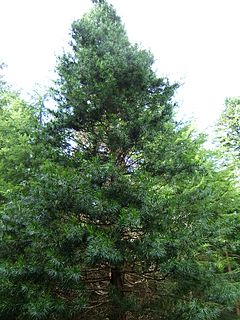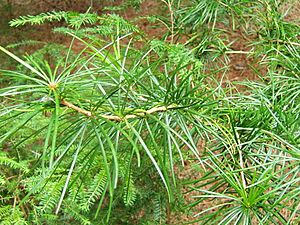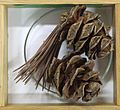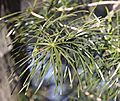Umbrella pines facts for kids
Quick facts for kids SciadopitysTemporal range: Middle Triassic to Recent
|
|
|---|---|
 |
|
| Sciadopitys verticillata | |
| Conservation status | |
| Scientific classification | |
| Kingdom: | |
| Division: | |
| Class: | |
| Order: | |
| Family: |
Sciadopityaceae
|
| Genus: |
Sciadopitys
|
| Binomial name | |
| Sciadopitys verticillata |
|
| Synonyms | |
|
|
The Japanese umbrella-pine, also known as Sciadopitys, is a very special tree. It is a type of conifer, which means it has cones and needles, like a pine or fir tree. This unique tree only grows naturally in Japan. It's the only living member of its plant family, Sciadopityaceae. Scientists call it a "living fossil" because its oldest relatives lived about 230 million years ago!
Contents
The Japanese Umbrella-Pine: A Living Fossil
The Japanese umbrella-pine is an evergreen tree. This means it stays green all year round. It can grow quite tall, reaching heights of 15 to 27 meters (about 50 to 90 feet).
What the Umbrella-Pine Looks Like
Its main branches are brown. They have groups of green "cladodes" that grow in circles around them. These cladodes are like flexible needles, about 7 to 12 centimeters (3 to 5 inches) long. They look like leaves and do the same job as leaves, but they are actually made of stem tissue. Sometimes, a cladode might split into two, and a small bud will grow in the split, just like on a normal stem.
Cones and Seeds
The tree produces cones that are 6 to 11 centimeters (2 to 4 inches) long. These cones take about 18 months to fully grow. When they are ready, their flat scales open up to release the seeds.
A Popular and Important Tree
The Japanese umbrella-pine is a very beautiful tree. People like to plant it in gardens, even though it grows slowly and can be expensive. In Japan, this tree is very important. A special type of umbrella-pine, called Koyamaki, was chosen as the Japanese Imperial crest for Prince Hisahito of Akishino. He is currently third in line to the Chrysanthemum Throne.
The tree was first brought to Europe by a person named John Gould Veitch in September 1860.
Ancient Amber Connection
Scientists have studied ancient Baltic amber using special tools. They found that conifers from the Sciadopityaceae family were the main source of this amber. Amber is fossilized tree resin, like a natural plastic.
Images for kids
See also
 In Spanish: Pino piñonero para niños
In Spanish: Pino piñonero para niños








